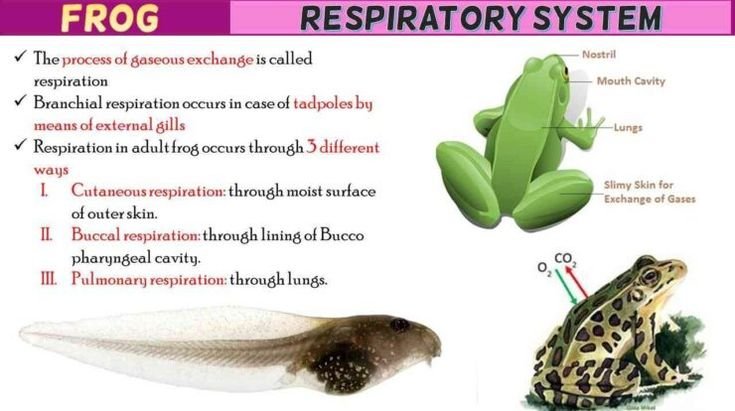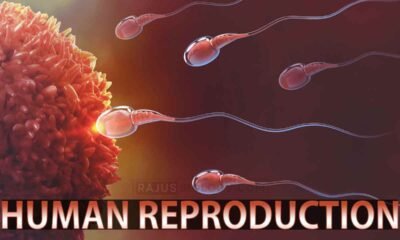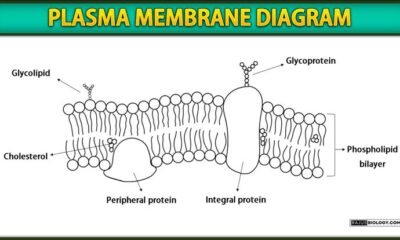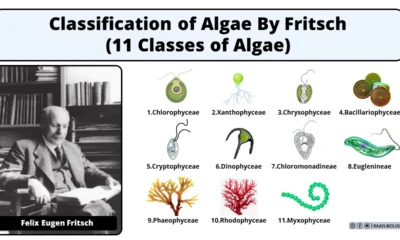Blog
Frog Respiratory System Short Notes | Free Biology Notes

In this article we will discuss about the frog respiratory system
Frog Respiratory System
- The process of gaseous exchange is called respiration
- The frog respiratory system help for respiration
- The frog respiratory system different in adult and larva
- Branchial respiration occurs in case of tadpoles by means of external gills
- Respiration in adult frog occurs through 3 different ways
- Cutaneous respiration: through moist surface of outer skin.
- Buccal respiration: through lining of bucco pharyngeal cavity.
- Pulmonary respiration: through lungs.
Cutaneous Respiration in Frog
- The respiration through skin is called cutaneous respiration
- The frog is under water or hibernating, it is the only mode of respiration
- The skin of frog is thin and has fine blood vessels
- Due the presence of mucous gland the skin of frog always remains moist
- During gaseous exchange the oxygen first dissolve moisture of body and then diffuse into the blood capillaries
- The carbon dioxide diffuses out from the blood into the environment
- Movement is not required in cutaneous respiration as skin remains exposed to air or water
Buccal Respiration in Frog
- Respiration done through the buccopharyngeal cavity then it is called buccopharyngeal respiration
- The floor of the buccal cavity is alternately raised and lowered
- The buccal cavity consists of moist mucous membrane and richly supplied with blood capillaries
- The air enters into the cavity through external nares and gaseous exchange takes place through the lining of buccal cavity
- The glottis closed during buccal respiration
Pulmonary Respiration in Frog
- The respiration through the lungs is called pulmonary respiration
- Frog respires by lungs when the need for oxygen is great
- Passage through which the air enters and leaves the lungs is termed as respiratory tract
- Respiratory tract consists of nostrils, buccopharynheal cavity, glottis, bronchi and lungs
- Nostrils: A pair of external and internal nostrils present
- Buccopharynheal cavity: the space between buccal cavity and pharynx
- Glottis: A slit like opening
- Bronchi: it is a pair of small tubes
- Lungs: pair of sacs. Numerous small air sacs are present in the lungs called alveoli. Alveoli help for gaseous exchange.
How Respiratory System Works In Frog?
- The inspiration and expiration of the air is done by the action of the buccal cavity
Inspiration
- The process of intake of air is called inspiration
- Now, the sternohyal muscles contract.
- The floor of buccal cavity is lowered
- Buccal cavity is enlarged and the air is drawn into the buccal cavity through the nostrils
- Now, the glottis opens and the closes the nostrils
- The pterohyal muscles contracts which raises the floor of buccal cavity
- By this mechanism the air passed into lungs
- In lungs, alveoli are filled with air and gaseous exchange takes place between blood and alveoli by diffusion.
Expiration
- The process of exhaling of CO2 is called expiration.
- The glottis closes when lungs are filled with air
- Soon, the glottis opens.
- The air in the lungs are driven out into the buccal cavity by lowering its floor
- The glottis closes when the buccal floor is raised again.
- Now, the air is expelled through the opened nostrils to outside.

 Blog8 months ago
Blog8 months ago[PPT] Human Reproduction Class 12 Notes
- Blog8 months ago
Contribution of Indian Phycologists (4 Famous Algologist)
- Blog8 months ago
PG TRB Botany Study Material PDF Free Download

 Blog8 months ago
Blog8 months agoCell The Unit of Life Complete Notes | Class 11 & NEET Free Notes

 Blog8 months ago
Blog8 months ago[PPT] The living world Class 11 Notes

 Blog8 months ago
Blog8 months agoPlasma Membrane Structure and Functions | Free Biology Notes

 Blog8 months ago
Blog8 months agoJulus General Characteristics | Free Biology Notes

 Blog8 months ago
Blog8 months agoClassification of Algae By Fritsch (11 Classes of Algae)













